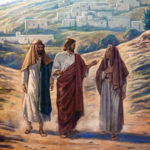• The BaptistWay Bible lesson for Feb. 22 focuses on John 21:1-25
Ever been lost? Confused? Disoriented? Sometimes, in order to go where you want, you must deal with where you are and how you got there. The Gospels depict Peter as an independent spirit with an impetuous nature and commanding personality. Neither weakness nor meekness was a trait he expressly admired. As a result, Peter knew well what it meant to stumble.
John, who was probably between 70 and 90 years old when he penned his Gospel, included details and stories he believed would draw people toward faith and enable them to experience full and abundant life. Part of faith includes mercy, even when we fail, and John felt it imperative to include an example of Jesus’ grace.
Back on track
So, using the Sea of Galilee as a backdrop, John’s final chapter reveals how Peter got back on track after what probably was the biggest mistake of his life. As sinful human beings, failures are inevitable, but John proves unmerited grace and “do-overs” are available for those who come when Jesus says, “Follow me.”
Uncertain what to do after Jesus’ resurrection and with his intermittent appearances, Peter and the other disciples resorted to old habits and familiar places (21:1-3). Fishing all night in the familiar waters of the Sea of Galilee where several had previously earned their livelihood, they caught nothing. They must have felt really out of practice!
Early in the morning, unrecognized by them, Jesus stood on the shore and called out, “Friends, haven’t you any fish?” When they answered negatively, Jesus instructed them to throw their net on the right side of the boat. As experienced fishermen, they could have ignored his suggestion. Instead, they decided they had nothing to lose. So, when they obeyed, the net became overloaded with fish.
An eerily familiar scene
John knew this seemed eerily familiar. They’d had the same experience three years prior when Jesus called them to leave their nets and fish for people (Luke 5:1-11). That’s when he turned to Peter saying, “It is the Lord,” and Peter jumped into the water, rushing to where Jesus stood. Immediately, the remaining disciples directed the boat toward the shore, towing the net of fish.
Sign up for our weekly edition and get all our headlines in your inbox on Thursdays
When they arrived, Jesus had ready for them what apparently was his favorite miracle meal—fish and bread—and served his friends this breakfast in much the same manner as when he fed the 5,000 and at the Last Supper. It must have felt like deja-vu all over again! And yet, there was something distinctive about this meal: It followed his resurrection (6:5-14). Nevertheless, there still was an unresolved issue. Jesus isn’t one to avoid conflict, especially if it will bring restoration, healing and peace. But it meant having a difficult conversation.
After Peter’s three-time denial of Christ before the crucifixion, Jesus graciously gave him as many opportunities to reinstate himself in fidelity and love (21:15-17). Asking, “Do you love me?” three times gave Peter the chance to reassert his loyalty as firmly as he professed it in Matthew 26:33. There, at the Mount of Olives, Peter claimed he never would fall away. So, now Jesus asked if Peter loved him more than his fellow disciples did. In the wake of his denial, was he prepared to speak so boldly again?
Feed my lambs
Rather than comparing himself to his friends, Peter in humility appealed to the Lord’s knowledge (oida or intellectual awareness) that he truly loved him, despite his failure. To his relief, Jesus proved his reinstatement by instructing, “Feed my lambs,” and then, “Take care of my sheep,” general instructions for shepherding. In other words, by caring for Christ’s followers, Peter’s love for Jesus is evident.
Jesus then asked a third time, “Do you love me?” The question grieved Peter, perhaps because he feared Jesus didn’t believe him or because he was so embarrassed over his earlier infidelity. So, he issued a stronger response, this time saying, you’ve (ginosko) experienced my love. But it’s possible Jesus asked Peter a third time so his fellow disciples, overhearing this conversation, would know with assurance Peter had a valid and vital place among them as a Christ-follower and future church leader.
The first two times Jesus questioned Peter, he used the Greek word agapao, translated in English as “love.” This kind of love connotes volitional commitment as well as affection. In the last question and in all of Peter’s responses, the word “love” is phileo, which implies friendship and fondness. Both words represent a high aspect of love and are used of God (3:16; 5:20) and humanity (14:21; 16:27) in John’s Gospel.
Jesus cleared the slate
Next, Jesus shared a word of warning for this strong disciple: One day, “Someone else will dress you and lead you where you do not want to go.” Jesus then commanded Peter to (literally) “keep on following me.” For Peter, it was a “do-over.” Standing beside the same sea where he’d first dropped his fishing nets (Luke 5:11), Jesus cleared the slate, giving him a chance to start anew.
For Peter, the commitment to follow meant a promise to sacrifice. He will spend his life for God’s glory and die in a manner comparable to his Savior. According to church fathers Origen and Eusebius, Peter was crucified upside-down. Ultimately, Jesus wanted to know if Peter loved him unconditionally and would express his love to the church at all costs. Fortunately, Acts and his epistles to the Jerusalem church—1 and 2 Peter—reveal Peter vividly and powerfully succeeded.
Now that he’s reinstated, Peter (unwisely) felt enough confidence to ask about John’s future. Jesus told him to mind his own business! His servants aren’t to compare their blessings or challenges with one another; they are simply to act in obedience as they follow.
How can we be sure?
How, then, can we be sure of Jesus’ grace and plan for our lives? In John’s epilogue (21:24-25), John states his legitimacy as a witness to Jesus’ life and ministry. In fact, “we know that his testimony is true,” indicates others vouched for the beloved disciple’s identity and veracity. The epilogue also emphasizes the incredible number of Jesus’ works. John wants readers to know he selectively chose what he included for its value and significance for following Christ.
We live in a world full of people who are searching for truth, meaning and purpose. If we allow ourselves to become bogged down in the mire of our failures, we’ll be a dim light in our dark world. Despite his earlier denials, Peter was forgiven and trusted with new responsibilities. We can have genuine hope, knowing all our sin is forgivable. Jesus calls for our continued repentance and love; he wants to use us to usher others into his kingdom, so they can experience the full and abundant life they, too, were created to know as they follow him. Step out of the chains of regret and walk in forgiveness and with renewed commitment to following his plan for your life.













We seek to connect God’s story and God’s people around the world. To learn more about God’s story, click here.
Send comments and feedback to Eric Black, our editor. For comments to be published, please specify “letter to the editor.” Maximum length for publication is 300 words.